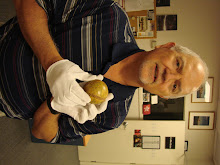I don't remember the first time I took the Myers-Briggs Personality Test. Could have been before seminary, but I'm just don't know. I do know that I taken it in various groups for various reason at least 6 times. The first 4 were all the same - ENFP - with an extreme E. The last 2 times - INFJ. Kathryn says I must have lied the first 4 times because I've always been judged mental(intentional spelling). But the I really threw me for a loop. I consider my self friendly and outgoing, a real extrovert. I was sharing this change with someone who knows about these things and he asked me where my favorite place was. I said it was up in the mountains or in my study reading and listening to music. He said, "Well, there is your answer, you want to be alone." But immediately and almost defensively I said, "But I love being at St. Thomas on Sunday morning." He said he thought that I was more of an introvert, but that I probably got my energy from being with that group of people. I think that is true.
The reason I say all that is because of some reading I am doing now, by myself, about community. Eugene Peterson, in Christ Plays in Ten Thousand Places, says, "Sectarianism is to the community what heresy is to theology, a willful removal of a part from the whole." He says it is a willful and deliberate decision to leave the large community, in order to form a smaller community of special interests. In terms of the Christian community it says YES to Paul's question in 1 Cor 1:13, "Has Christ been divided?" It is group selfishness. It confuses uniformity with unity, and tries to make holy that which is not, because separation from the Body of Christ is separation from Christ. It is built upon self-spirituality, which is cafeteria style: I'll take a little of this and a little of that, oh, and some of that as well. Earlier he speaks of the Biblical sense of 'spiritual'. Spirituality is not even in the Bible. St. Paul used the word 'spiritual' to refer to actions or attitudes derived from the work of the Holy Spirit. It wasn't until the medieval Church that the word 'spirituality' was widely used and it was used to speak of the study and practice of living life as Jesus called us to and enabled by sending the Holy Spirit. Spirituality must be grounded in Christ and that is why the Eucharist is the central act of worship for Christians, because without it our spiritual formation in dominated by ideas about Jesus instead of receiving like from Jesus. And, Peterson says. "Spiritual formation is primarily what the Spirit does." Which means it is not so much about what we are doing. And this happens in community, because that is where Jesus is - the Body of Christ, His holiness and our humanity.
Sooooo, my time alone must be fed by guided by my time in community.
God bless you.
Saturday, October 9, 2010
Subscribe to:
Post Comments (Atom)

No comments:
Post a Comment